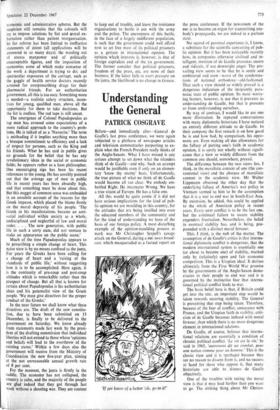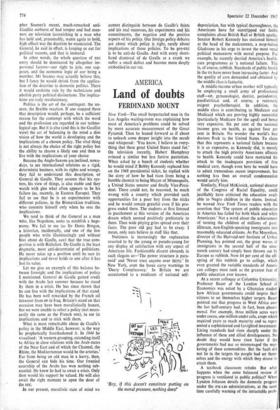Understanding the General
PATRICK COSGRAVE
Before—and immediately after—General de Gaulle's last press conference, we were again subjected to a plethora of newspaper articles and television commentaries purporting to ex- plain what the French President really thinks of the Anglo-Saxons. What I have missed is any serious attempt to set down what the islanders think of de Gaulle—and why. Such an attempt would be justifiable even if only on an elemen- tary 'know thy enemy' basis. Unfortunately, the true picture of what we think of de Gaulle would become all too clear. We embody em- battled Right. He incarnates Wrong. We have a true vision of Europe. He has a false one.
All this would be quite comic if it did not have serious implications for the kind of pub- lic opinion we are moulding in this country, for the attitudes that are being instilled into even the educated members of the community and for the kind of understanding we have of the basis of our foreign policy. A most disturbing example of the opinion-moulding process at work was Mr Christopher Serpell's savage attack on the General, during a BBC news broad- cast, which masqueraded as a factual report on the press conference. If the newsroom of the BBC is to become an organ for transmitting any- body's propaganda, we are indeed in a parlous state.
No record of personal experience is, I know, a substitute for the scientific canvassing of pub- lic opinion. But it has been noticeable recently how, in companies otherwise civilised and in- telligent, mention of de Gaulle provokes sneers and ridicule, if not downright anger. The pre- vailing view seems to be that he is senile and embittered and even—worst of the condemna- tions of national orthodoxy—old-fashioned. That such a view should so widely prevail is a dangerous indication of the incipiently para- noiac state of public opinion. Its most worry- ing feature, however, is not that it prevents us understanding de Gaulle, but that it prevents us from understanding ourselves.
By way of contrast, I would like to use one more illustration. In repeated conversations with many diplomatic historians I have noticed an entirely different attitude to de Gaulle. In their company the first remark is on how good he is and how bad, by comparison, his oppo- nents are. Even making all due allowances for the fallacy of putting one's faith in academic opinion, it is surely not wholly without signifi- cance that a view so widely different from the common one should, somewhere, prevail.
The difference between the two views lies, I think, in the moralistic content of one (the con- ventional view) and the absence of moralistic content in the academic view. Mr Walter Lippmann observed the other day that the underlying fallacy of America's war policy in Vietnam seemed to him to be the assumption that it is a war to end war in South-East Asia. By extension, he added, this could be applied to the whole of American policy in recent years. Every next conflict is to be the last one, but the continual failure to secure stability engenders frustration. Nevertheless, the belief in eventual stability has, and is being, pro- pounded with a distinct moral fervour.
This, I think, is the nub of the matter. The assumption of de Gaulle's critics is that interna- tional diplomatic conflict is dangerous, that the modern international system is essentially one (or about to become one) of stability, marked only by (relatively) open and fair economic competition. This is a Utopian ideal. It derives ultimately from the First World War promise by the governments of the Anglo-Saxon demo- cracies to their people to end war and it is governed by the instinctive fear that interna- tional political conflict leads to war.
The basic belief here is that, if Britain could get into the EEC, an important step would be taken towards securing stability. The General is preventing that step being taken. Therefore, because of the fear of conflict, annoyance with France, and the Utopian faith in stability, criti- cism of de Gaulle becomes imbued with moral fervour, than which there is no more dangerous element in international relations.
De Gaulle, of course, believes that interna- tional relations are essentially a condition of chronic political conflict. 'Le vie est la vie,' he said in 1965, 'autrement dit un combat, pour une nation comme pour un homme.' This is the classic view and it is (perhaps) because they see no reason to dissent from it, and no success at hand for those who oppose it, that many historians are able to discuss de Gaulle objectively.
One of the troubles with taking the moral view is that it may lead further than you want to go. The striking thing about Mr Christo-
pher Soames's recent, much-remarked anti- Gaullist outburst of bad temper and bad man- ners on television (astonishing in a man who has held and, presumably, wants again to hold, high office) was the doctrine he enunciated. The General, he said in effect, is keeping us out for political reasons, and that is immoral.
In other words, the whole question of EEC entry should be dominated by altogether im- personal factors—our right to join, one sup- poses, and the economic logic of our being a member. Mr Soames may actually believe this, but I fancy he would shrink from the applica- tion of the doctrine to domestic politics. There it would enshrine rule by the technicians and abolish party political distinctions. The implica- tions are truly revolutionary.
Politics is the art of the contingent, the un- seen, the flexible reaction. If one stopped there that description would, perhaps, be a sufficient reason for the contempt with which the word and the profession are regarded in our techno- logical age. But it is also (and this is the Gaullist view) the art of balancing in the mind a dim vision of how the world is developing and the implications of a chosen policy. The vital thing is not always the choice of the right policy but the ability to choose a likely one and then to live with the implications of your choice.
Because the Anglo-Saxons are inclined, nowa- days, to see international relations as a rigid, determinist business, with its rights and wrongs, they fail to understand this description, or General de Gaulle. They assume that his sys- tem, his view of things, is also stable and they watch with glee what often appears to be his failure (as, recently, in Eastern Europe). They fail to see that he is an experimenter with different policies, in the Bismarckian tradition, who commits himself only when he sees the implications.
We tend to think of the General as a man who, like Napoleon, seeks to establish a hege- mony. We fail to see (as Sir Denis Brogan, a historian, incidentally, and one of the few people who write illuminatingly and without bias about de Gaulle, saw) that the true com- parison is with Richelieu. De Gaulle is the least dogmatic, most anti-determinist of politicians. He never takes up a position until he sees its implications and never holds to one after it has lost its value.
Let me give an example of this balance be- tween foresight and the implications of policy I mentioned. General de Gaulle gained credit with the Arabs last summer because he stood by them in a crisis. He has since shown that he can live with the implications of that stand. lie has been well rewarded by the French oil takeover from,BP in Iraq. Britain's stand on that occasion may have been moralistically honest, but we were unable to select a policy (not neces- sarily the same as the French one), to see 'its implications and to stick with them.
What is most remarkable about de Gaulle's policy in the Middle East, however, is the way he prophetically foreshadowed it. In 1944 he visualised : 'A western grouping, extending itself to Africa in close relations with the Arab states of the Near East and of which the Channel, the Rhine, the Mediterranean would be the arteries.' Far from being an old man in a hurry, then, the General can bide his time. Our frenzied courtship of the Arabs has won nothing sub- stantial. He knew he had to await a crisis. Only then would his support be valued. He will also await the right moment to open the door of the EEC.
In our present, moralistic state of mind we cannot distinguish between de Gaulle's feints and his real successes, his experiments and his commitments, the negative and the positive aspects of his policy. Our foreign policy debates are about which policy is right, rarely about implications of those policies. To be pro-sac is to be anti-de Gaulle.. And with every short- hand dismissal of de Gaulle as a crank we suffer a small defeat and become more deeply embedded in our rut.



































 Previous page
Previous page